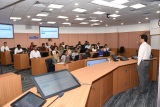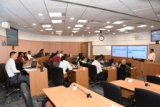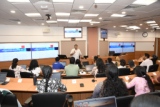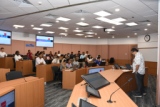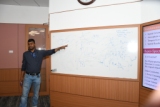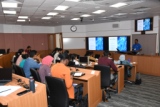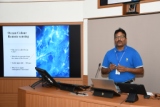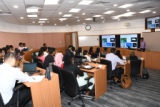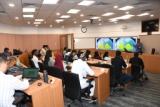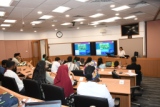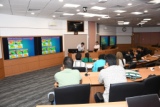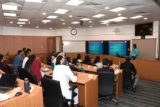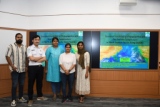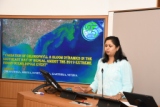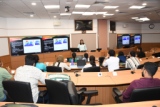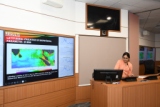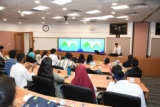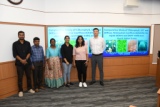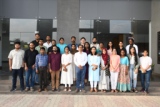ESSO - Indian National Centre for Ocean Information Services
(An Autonomous Body under the Ministry of Earth Sciences, Govt. of India)
OTGA-INCOIS Training Course
on
"Ocean Colour Remote Sensing Data, Processing and Analysis [blended course]"
during December 04-08, 2023.
Organized by
International Training Centre for Operational Oceanography (ITCOocean)
ESSO-INCOIS, Hyderabad, India
Ocean colour analysis is a proven tool for determining the health of ocean using oceanic biological activity through optical means. Phytoplankton pigment, chlorophyll, are indicators of equilibrium of CO2 concentration between atmosphere and ocean. The oceanic colour changes due to chlorophyll a provides the level of primary productivity whereas the colour change due to CDOM can be attributed to the level of pollution and higher particulate matter. The ability of optical sensors to map the spatial and temporal patterns of ocean colour over regional and global scales has provided important insights into the fundamental bio-optical properties and bio-physical processes occurring in the aquatic media. Chlorophyll, SST and PAR can be operationally scaled up to estimate primary production and estimate the fish stocks. This training focuses on the basics of marine optics, ocean colour remote sensing, and its applications such as mapping primary productivity, phytoplankton classes and algal blooms.
By the end of the course the participants should be able to:
- Explain what Ocean Colour Remote Sensing and Marine optics are, and describe Ocean colour- sensor characteristics, data, and uncertainties.
- Describe Ocean colour Algorithms, Chlorophyll, shallow water remote sensing, algal blooms.
- Perform atmospheric correction of ocean colour observations.
- Describe primary production mechanisms and P-I experiments.
- Perform phytoplankton classification using ocean colour data.
- Use the SeaDAS tool for processing ocean colour data (including the software and Plug-in tools for ocean data processing).
- Use different ocean colour algorithms.
- Generate and validate ocean colour remote sensing products.
- Understand ocean colour applications like PP, HABs etc.
Course content (Topics and activities to be covered)
- L1: Fundamentals of marine optics and ocean colour remote sensing (Aneesh A. Lotliker)
- L2: Introduction to ocean colour satellite data processing with SeaDAS (Alakes Samanta)
- L3: Marine environmental variables vis-a-vis phytoplankton (Sanjiba Kumar Baliarsingh)
- L4: Ocean Colour Algorithms - Standard and Value-added products (Alakes Samanta)
- P1: Introduction to SeaDAS: processing capability and available tools; Processing, Projection and Binning of satellite ocean colour data using GUI of SeaDAS (Alakes Samanta / Sanjiba Kumar Baliarsingh)
- L5: Remote sensing of phytoplankton functional types (Sanjiba Kumar Baliarsingh)
- L6: Remote sensing in operational services (TBD)
- P2: Automatic processing of ocean colour satellite data using SeaDAS (Alakes Samanta / Sanjiba Kumar Baliarsingh)
- L7: Laboratory Analysis of optically active substances (TBD)
- P3: Generation of value-added products using SeaDAS (Alakes Samanta / Sanjiba Kumar Baliarsingh)
- P4: Mini Project
Target audiences include, but are not limited to, the following:
- Ocean and coastal data managers
- Staff and researchers working on ocean colour applications.
- Scientific/Technical staff involved in policy/decision making.
- University graduates.
NOTE:
Priority will be given to participants originating from the Indian Ocean Rim countries. UNESCO is committed to promote gender equality:applications from women are strongly encouraged.
Language of instruction:
English
Instructors:
- Dr. Aneesh Lotliker, Scientist INCOIS, MoES
- Mr. Alakes Samanta, Scientist INCOIS, MoES
- Dr. Sanjiba Kumar Baliarsingh, Scientist INCOIS, MoES
- Dr. Andrea Corredor-Acosta, Post-doctoral Investigator, IDEAL, University of Chile
- Dr. Aditya Nayak, Associate Professor, Florida Atlantic University, USA
- Mr. Amit Kumar Jena, Prime Minister's Research Fellow, IIT Bombay
- Dr. Prem Kumar R., Scientist, INCOIS, MoES
- Dr. N Srinivasa Rao, Scientist, INCOIS, MoES
Notes:
Pre-course Activities or Assessment
The mandatory online phase of the course takes place between 27-30 November 2023 and this will be followed by the onsite course between 4-8 December 2023. The shortlisted candidates are expected to complete all the online course material and finish reading the material and the assignments before participating in the onsite course. The grades of the assignments will be added to the final grades.
Candidates must also familiarize themselves with the following:
- Basic terminal commands (bash) in Linux (ubuntu) based system.
- NetCDF files data structure
- Understanding Satellite data levels (L0, L1, L2, L3)
- Understanding basic concepts of ocean optics
Assignment and tests will be conducted during the course while undergoing training. Pre-course assignments will also be counted for final grade.
Course Pre-requisites:
Language and computer skills required:
Applicants are expected to have:
- a working knowledge of English
- basic computer skills
- finding resources through search engines
- downloading and installing software
- using a word processing, presentation software, or other productivity applications
- using a data plotting application (e.g., Grapher, Origin, Sigma Plot)
- experience/familiarity with a variety of file formats such as: .pdf, doc or .docx, .txt, and .csv
- the ability to be self-directed in learning new technology skills (e.g., following a step-by-step tutorial, online video help, or access to support to learn necessary skills)
- Computer with Linux based (ubuntu) operating system or dual boot with Linux
- Latest version of either Chrome, Edge, Firefox, or Safari web browsers
- Linux (preferably ubuntu 16.04 or above)
- Install SeaDAS (https://seadas.gsfc.nasa.gov/downloads/)
- Access to internet (access during the onsite phase will be provided by INCOIS only to those who have valid antivirus installed)
- For dual boot systems with Linux-Windows, Original Windows OS and active antivirus subscription required for INCOIS provided internet access.
- Only professional or technical staff in the field will be considered (students in graduate level are not admitted)
- Endorsement of the application by his/her employer (by means of a letter of support from the entity to which he belongs and to which he/she will apply the acquired knowledge) is mandatory.
- The expected impact of training on the institution from where the participant is attending.
- Priority will be given to participants from Indian Ocean RIM countries.
- Course Coordinator: TVS Udaya Bhaskar (uday@incois.gov.in)
- OTGA Secretariat: ioc.training@unesco.org
Technology requirements:
To complete this course, you should have access to:
Application Process :
A limited number of seats (30) is available.Please fill the online application form: https://otga.wufoo.com/forms/zshmct11g5hmdf/ The deadline to submit the application is 20 September 2023 (23:59 CET: Central European Time). There are no tuition fees.
UNESCO is committed to promote equal access principles. Applications from minority or underrepresented groups are strongly encouraged.
A limited number (up to 5 seats depending on costs) of fellowships for international participants is available (partial or in full). For international participants requesting financial support (full or partial), a dully signed endorsement letter from the institution where the applicant is working is mandatory, to be uploaded on the online application form (email not accepted). Failure to submit it will imply automatic exclusion.
Selection Process :
For more detailed information on how to apply here:
No tuition fee applies. A limited number of fellowships is available.
Course Dates :
04-08 December, 2023
Contacts:
In case of questions please contact the Course Coordinator and the OTGA Secretariat, always using the name of the course as email subject.
Cancellation policy:
In the event of cancellation of the course by the OTGA or its affiliates, we will provide notification of cancellation at least 7 days prior to the course date. In the event of cancellation by the attendee, we should receive notification of cancellation at least 7 days prior to the course date.
Website:
Programme Schedule
| Time | Day1(4th Dec 23) | Day2(5th Dec 23) | Day3(6th Dec 23) | Day4(7th Dec 23) | Day5(8th Dec 23) |
|---|---|---|---|---|---|
| Inaugural Session | |||||
| L1:Fundamentals of remote sensing with emphasis on ocean colour (Aneesh Lotliker) | L3:Applications of remote sensing with special emphasis on ocean colour (N Srinivasa Rao) | L5: In situ digital holographic approaches to study thin layers, HABs, and other biophysical interactions (Aditya Nayak) | L7:Phytoplankton functional types from space: opportunities and challenges (Andrea Corredor-Acosta in Virtual Mode) | Mini Project | |
|
L2:Introduction to ocean colour satellite data processing with SeaDAS(Alakes Samanta)
|
L4:Ocean Colour Algorithms - Standard and Value-added products(Alakes Samanta) |
L6:Marine environmental variables vis-a-vis phytoplankton
(Sanjiba Kumar Baliarsingh)
|
P4:Automatic processing of ocean colour satellite data using SeaDAS(Alakes Samanta&Amit Jena) | Mini Project (Supervision: Alakes Samanta, Amit Jena, & Prem Kumar) | |
| P1:Introduction to SeaDAS: processing capability and available tools; Processing, Projection and Binning of satellite ocean colour data using GUI of SeaDAS(Alakes Samanta &Amit Jena) | P2:Introduction to SeaDAS: processing capability and available tools; Processing, Projection and Binning of satellite ocean colour data using GUI of SeaDAS(Alakes Samanta /Amit Jena) | P3:Automatic processing of ocean colour satellite data using SeaDAS(Alakes Samanta &Amit Jena) | Mini Project (Supervision: Alakes Samanta,Amit Jena, &Prem Kumar R) |
|
|
| P1:Introduction to SeaDAS: processing capability and available tools; Processing, Projection and Binning of satellite ocean colour data using GUI of SeaDAS(Amit Jena& Prem Kumar) |
P2:Introduction to SeaDAS: processing capability and available tools; Processing, Projection and Binning of satellite ocean colour data using GUI of SeaDAS(Amit Jena& Prem Kumar)
|
P3:Automatic processing of ocean colour satellite data using SeaDAS (Amit Jena&Prem Kumar) | Mini Project (Supervision: Alakes Samanta, Amit Jena, & Prem Kumar) |
|
|
Photo Gallery




